Vice President William Lai (賴清德) won the presidential election last night, delivering the Democratic Progressive Party (DPP) a record third term in office.
It is the first time since direct presidential elections began in Taiwan in 1996 that a party has won the presidency in more than two consecutive elections.
Voting began at 8am at nearly 18,000 polling stations, with almost 20 million people eligible to cast ballots. Polls closed at 4pm, with vote-counting by hand starting almost immediately. There was no electronic, absentee, proxy or early voting.
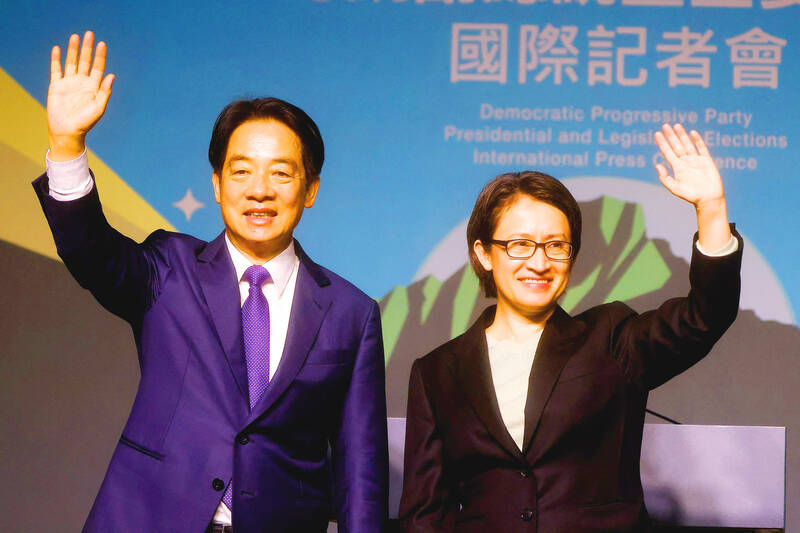
Photo: Ann Wang, Reuters
DPP presidential candidate William Lai (賴清德) received 5,586,019 votes, or 40.05 percent of the total, while Chinese Nationalist Party (KMT) candidate and New Taipei City Mayor Hou You-yi (侯友宜) won 4,671,021 votes, or 33.49 percent of the total, Central Election Commission figures showed.
Taiwan People’s Party (TPP) Chairman Ko Wen-je (柯文哲) received 3,690,466 votes, or 26.46 percent of the total.
Voter turnout was 71.86 percent for the presidential election.
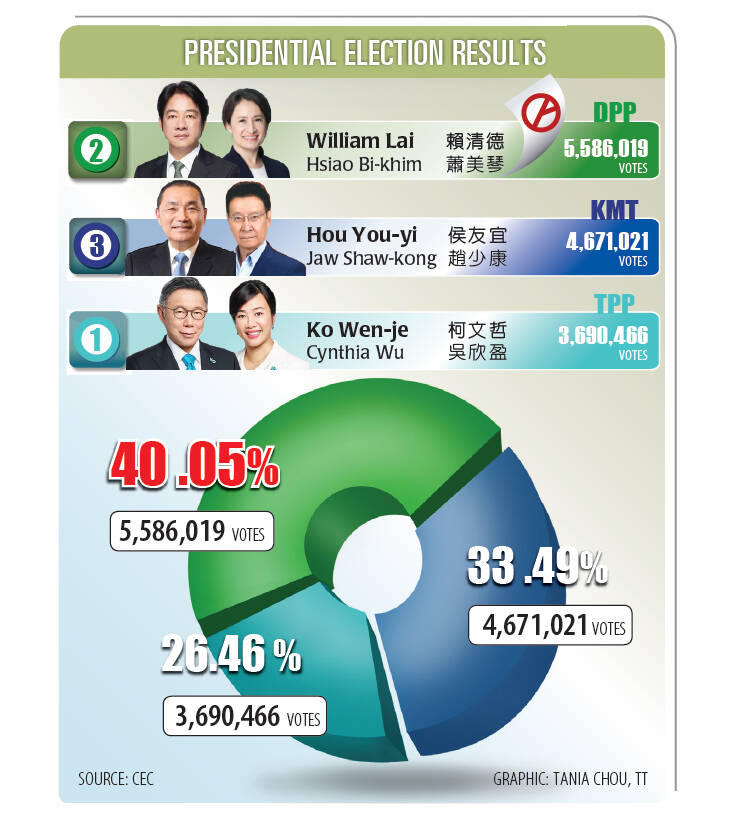
In 2020, the DPP’s presidential ticket won 8,170,231 votes, or 57.13 percent of the 19,311,105 registered voters, with the then-KMT presidential ticket garnering 5,522,119 votes (38.61 percent) and the People First Party’s ticket getting 608,590 votes (4.26 percent). The voter turnout in that election was 74.9 percent.
In a victory speech in front of thousands of jubilant supporters at his national campaign headquarters in New Taipei City, Lai thanked voters for their support.
“I want to thank Taiwanese for writing a new chapter in our democracy,” he said. “We are telling the international community that between democracy and authoritarianism, we will stand on the side of democracy.”
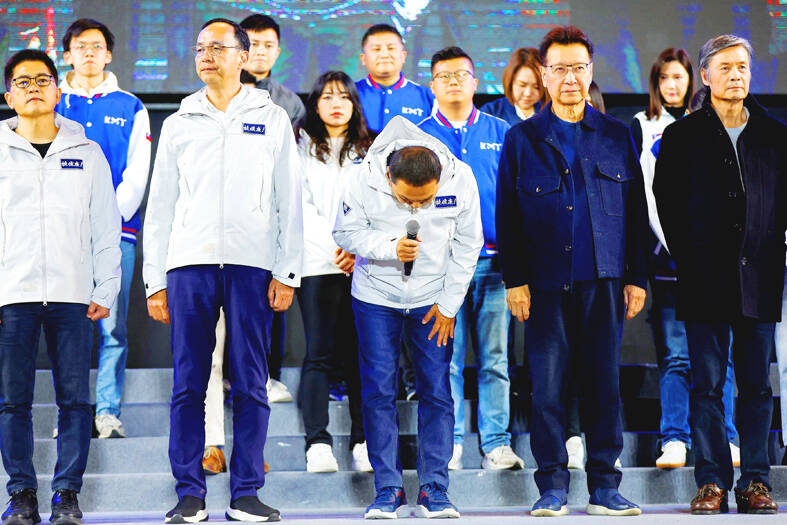
Photo: Carlos Garcia Rawlins, Reuters
“Being the first election in this global election year, Taiwan has achieved the first victory for the alliance of democracies and successfully deterred interference from external forces,” he said. “It is all because we believe in electing our own president, and the nation will continue walk on the right path and not turn back.”
Lai reiterated that safeguarding peace and stability in the Taiwan Strait would be an important mission in his presidency, adding that he would work to maintain the “status quo,” while engaging in exchanges and dialogues with China based on an equal footing.
Noting that he had received congratulatory telephone calls from both of his opponents, Lai said that he has also congratulated the KMT and the TPP for their legislative wins and expressed the hope that they would work together for the nation.
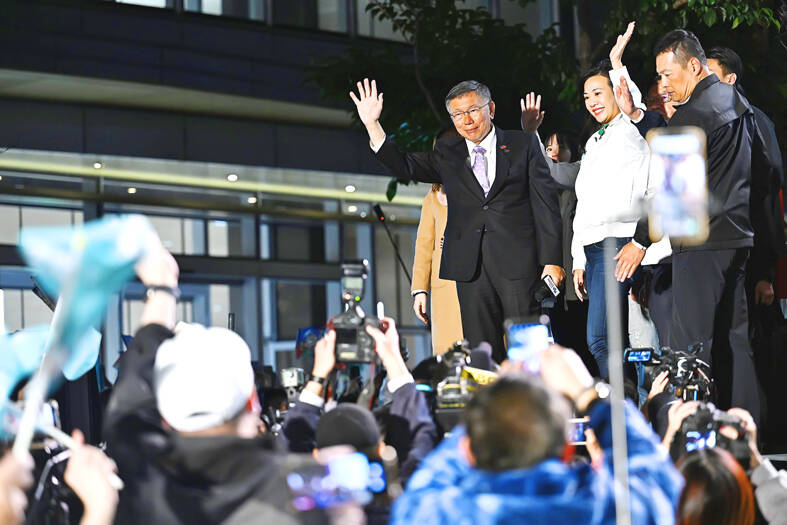
Photo: Chen Chih-chu, Taipei Times
“Now that the election is over, the conflicts and high emotions that have occurred in the course of the campaign should end,” he said. “Taiwan’s 23 million people are a family. Let us unite and move the nation forward.”
Hou conceded defeat at a news conference at 8pm.
“I am sorry I have let everyone down,” he said, before bowing in front of supporters, adding that he had not tried hard enough “to make a transfer of power possible.”
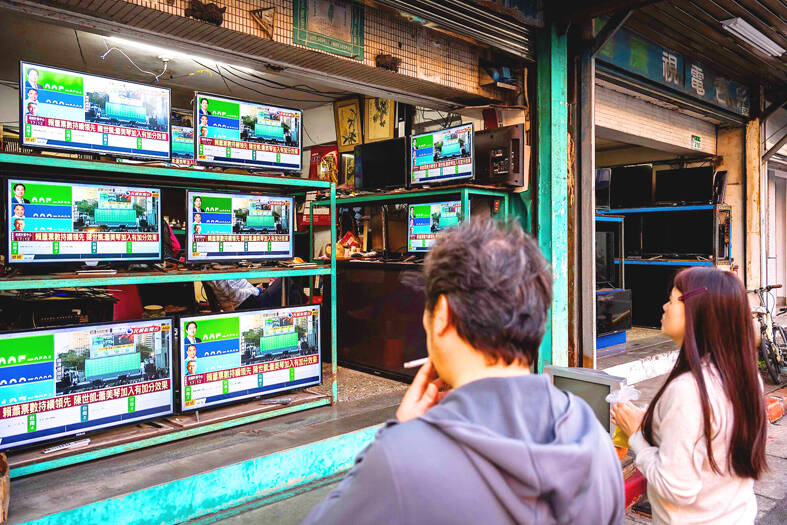
Photo: Billy H.C. Kwok, Bloomberg
He said that a democracy means that people are masters of their government, and he fully respects Taiwanese voters’ decision, as he extended congratulations to Lai and his running mate, Hsiao Bi-khim (蕭美琴).
He added that he hopes that Lai and Hsiao would not let voters down.
“The governing party must listen to the people’s voices,” he said.
Hou told his supporters to not give up hope.
“We can be sad, but not deflated,” he said.
“Let’s turn our sadness into a force to keep the DPP in check. That is the force needed to keep Taiwan moving forward, and also the force for safeguarding the Republic of China,” he added.
Ko, who has won a passionate support base in recent years, especially among young voters, also called a news conference at 8pm and conceded the election.
Despite losing, he said the TPP “has proven to the world that Taiwan is no longer just blue and green.”
“On the path of justice and sustainable development, I will not give up and I urge everyone not to give up either,” Ko said.
“You are the nation’s future, you are also the reason that the TPP and I will continue,” he said, adding that “democracy is ultimately Taiwan’s most important asset,” and the TPP would seek to build more support over the next four years.
President Tsai Ing-wen (蔡英文) is constitutionally barred from standing again after two terms in office.
The new president and vice president are to be sworn in on May 20.

CHAOS: Iranians took to the streets playing celebratory music after reports of Khamenei’s death on Saturday, while mourners also gathered in Tehran yesterday Iranian Supreme Leader Ayatollah Ali Khamenei was killed in a major attack on Iran launched by Israel and the US, throwing the future of the Islamic republic into doubt and raising the risk of regional instability. Iranian state television and the state-run IRNA news agency announced the 86-year-old’s death early yesterday. US President Donald Trump said it gave Iranians their “greatest chance” to “take back” their country. The announcements came after a joint US and Israeli aerial bombardment that targeted Iranian military and governmental sites. Trump said the “heavy and pinpoint bombing” would continue through the week or as long

TRUST: The KMT said it respected the US’ timing and considerations, and hoped it would continue to honor its commitments to helping Taiwan bolster its defenses and deterrence US President Donald Trump is delaying a multibillion-dollar arms sale to Taiwan to ensure his visit to Beijing is successful, a New York Times report said. The weapons sales package has stalled in the US Department of State, the report said, citing US officials it did not identify. The White House has told agencies not to push forward ahead of Trump’s meeting with Chinese President Xi Jinping (習近平), it said. The two last month held a phone call to discuss trade and geopolitical flashpoints ahead of the summit. Xi raised the Taiwan issue and urged the US to handle arms sales to

State-run CPC Corp, Taiwan (CPC, 台灣中油) yesterday said that it had confirmed on Saturday night with its liquefied natural gas (LNG) and crude oil suppliers that shipments are proceeding as scheduled and that domestic supplies remain unaffected. The CPC yesterday announced the gasoline and diesel prices will rise by NT$0.2 and NT$0.4 per liter, respectively, starting Monday, citing Middle East tensions and blizzards in the eastern United States. CPC also iterated it has been reducing the proportion of crude oil imports from the Middle East and diversifying its supply sources in the past few years in response to geopolitical risks, expanding

Pro-democracy media tycoon Jimmy Lai’s (黎智英) fraud conviction and prison sentence were yesterday overturned by a Hong Kong court, in a surprise legal decision that comes soon after Lai was jailed for 20 years on a separate national security charge. Judges Jeremy Poon (潘兆初), Anthea Pang (彭寶琴) and Derek Pang (彭偉昌) said in the judgement that they allowed the appeal from Lai, and another defendant in the case, to proceed, as a lower court judge had “erred.” “The Court of Appeal gave them leave to appeal against their conviction, allowed their appeals, quashed the convictions and set aside the sentences,” the judges